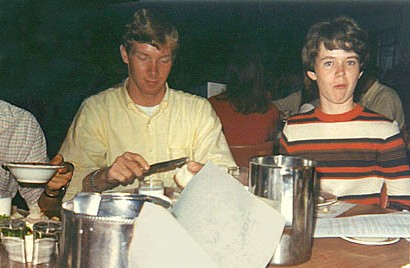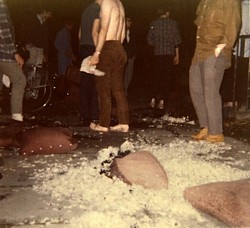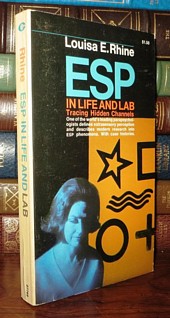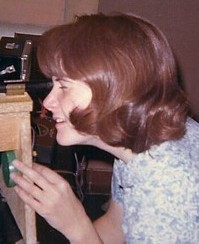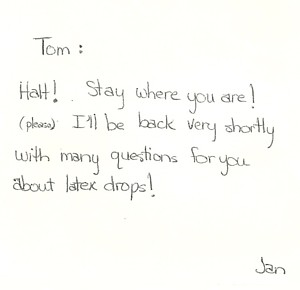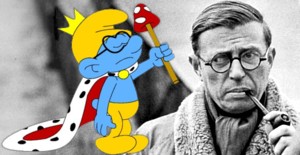|
|
|
May |
||||||||||||||
|
^ |
May 1968
Added to website
May 1, 2018
|
On Honors Day (Thursday, May 2), as my final month as an Oberlin College junior began, I discovered a bright red box on my doorstep. Inside I found an anonymously-typed CONGRATULATIONS! note, plus two pounds of homemade fudge. The occasion was my induction into Phi Beta Kappa as part of a three-hour ceremony. |
|
At the time, the honorary society included 68 seniors (or about 13% of the Class of 1968). Now six juniors had been elected, receiving the honor of “early admission.” Later, during my senior year, several dozen additional Class of 1969 members would join us.
My grade point average at the time was approximately 3.9, with 4.0 the highest possible. Presumably we six were the top 1% of our class.
|
|
|
|
|
|
|
|
Nancy |
Russ |
Carl |
Susan |
Bill |
Tom |
Pretend Politics
The next night marked the start of the college's Mock Convention, which would “nominate” a candidate for President in the same manner as at the real 1968 Republican National Convention in August. This was a major event on campus.
|
|
The fun had kicked off with a parade down Main Street. Floats and elephants passed a reviewing stand full of “dignitaries” in front of Hall Auditorium. (I found these photos on the Internet.) |
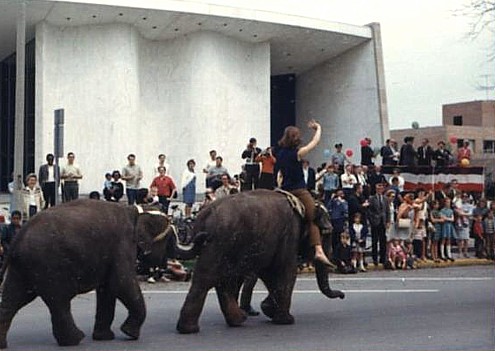
|
|
Students portrayed delegates from various states. These ladies (here is another) pretended to be supporting Gov. George Romney of Michigan. He was a former auto executive and the father of future nominee Mitt Romney. |
|
This Volkswagen Beetle was tasked with pulling the float backing Sen. Hiram Fong of Hawaii. On the trailer were fake palm trees and hula dancers, all purporting to be Republican. However, the car's bumper sticker betrayed its owner's true feelings. |
|
According to the Oberlin Review, the students who impersonated convention delegates did not all agree on how to play their roles. Should they vote as if they were real-world Republican politicians, or should they vote their own consciences? Should they be conservatives or liberals?
“Senior Bill McClintock and steering committee members advocated political realism as the most educational and meaningful criterion. Many students, however, recommended personal preference, hoping to use Mock Convention as an expression of student opinion. In the end, the Convention necessarily provided a mixture of the two.”
The Steering Committee suggested that delegates “consider equally what the Republican Party will do and what it should do.”
Much of WOBC relocated to Jones Field House for the event. I described my part here.
Here's what I didn't know at the time about the invited speaker who gave the keynote address, Charles Goodell, a Republican Congressman from New York.
|
• He was soon to become a Senator from New York. Sen. Robert F. Kennedy (D) would be assassinated the following month, and three months after that, Gov. Nelson Rockefeller (R) would appoint Goodell to the remaining two-plus years of RFK's term. In the Senate, Goodell became somewhat more liberal. Perhaps his brief visit to Oberlin had opened his eyes. • His nine-year-old son Roger Goodell (far right) would grow up to be named Commissioner of the National Football League in 2006.
|
|
|
Ted Gest and Paul Sturm anchored WOBC's live gavel-to-gavel coverage of the Convention, while Gideon Schein, Bob Steyer, and others reported from the floor. I remained at the controls back at the radio station — at least for the first 3½ hours Friday evening. On Saturday, before my shift, I wandered up to the Field House and watched another Congressman, future president Gerald Ford, speak at 7:15. After nominating speeches got under way at 8:00, I soon departed. I returned to the control room for the final 5½ hours, staying on the air until 3:00 Sunday morning. Our Mock Convention nominated Nelson Rockefeller for President. The real Convention would not. They chose “Tricky Dick” Nixon. |
|
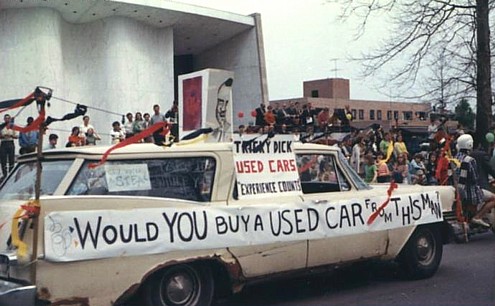
Station Reconstruction
The following Thursday afternoon, May 9, I met at WOBC with seniors John Heckenlively and Paul Sturm plus engineers Tom Ammons and Gary Freeman. According to my report to the Board of Trustees later that day, Tom and Gary told us they'd learned a lot recently “in their effort to build a very small ‘console’ for use at Mock Convention as a mixer for the PA microphones. They almost got this mixer completed but ran into a problem in getting the various components to work together properly when connected to the same power supply.”
It had originally been our plan that over the summer, Tom and Gary would tear out the aging control panel in WOBC's on-air control room and construct a new console at an estimated cost of $4,000. Why build a home-made console? Well, a professional audio board would have cost much more and wouldn't have been as much fun. But if similar difficulties arose, we might be left without any console in September.
Therefore, we decided “to test thoroughly before buying all the parts and beginning to build.” Final assembly might have to be delayed until the summer of 1969.
The engineers promised that “the partial construction and repairs to be done this summer will put us in better technical shape this fall than we've been in for several years, despite the fact that the old switching circuitry is still threatening to give out within a year or so and must eventually be replaced.”
A small prototype would be installed in the DJ studio in the summer of 1968, but I didn't get to see the new console until after I had graduated. It was stereo-capable, of course. However, WOBC wouldn't acquire an FM stereo transmitter for a few years more after that.
In May of ’68 — in the Garden of Eden, honey — we played songs like this. We couldn't transmit them in stereo, but now, via YouTube, you can watch a video recorded that month by I. Ron Butterfly and listen in glorious two-channel sound. As an amateur organist, I especially enjoy the keyboard solo that starts at 9:08, with the Leslie tremolo kicking in at 9:57.
High Jinks
One evening, I took my camera to dinner at the dining room of the South Hall dormitory.
|
Ten students were seated at each round table, with its pitchers of milk and water. Here we see Lee Beckett buttering his bread while Barbara Greer looks at me in surprise. A wider view is here. |
|
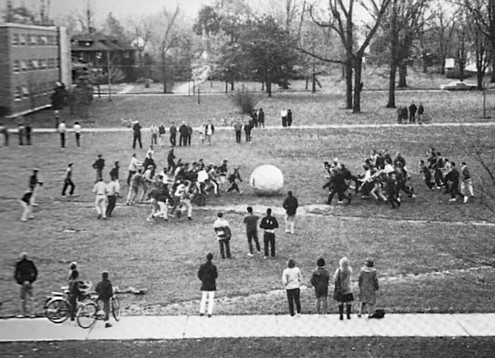
|
|
At my dorm, Noah Hall, it was usually pretty quiet in my single room up on the third floor. Sometimes I could look out my window and see activity in the Men's Quad, like these yearbook pictures from my sophomore year. And during my junior year, my next-door neighbors played Sgt. Pepper's Lonely Hearts Club Band so often that I soon had all the songs memorized.
|
Worries Transmitted via ESP
Families today are in constant contact, texting each other with updates on their activities. But this was not the case in the Sixties. The only means of communication were telegrams (which were hardly ever sent), or letters, or telephone calls. A letter took time to write and to reach its destination, and a long-distance phone call was expensive.
Jan Olson admitted “I call home very seldom,” and her older siblings, brother Carl and sister Lynn, did so even less often.
I, on the other hand, generally phoned home every Sunday evening, when the rates were lower. That included a Mother's Day call on May 12. It happened that Jan's brother Carl likewise called his mom that night.
|
Then the following day, Lynn (right) did the same. “I had to call,” she told her mother. “I don't know what is wrong, but something must be. I couldn't sleep last night.” According to Jan, who related this story to me a couple of months later, “Mom assured Lynn that everyone at home was fine, but that she had been worrying about Lynn's plans for a summer camping trip.” |
|
The day after Lynn's call, May 14, Jan confided to me that she was uneasy and felt she should call home. This wasn't because her siblings had done so — she was unaware of that — but because of “a very bad dream” the night before, in which both Lynn and her mother were in danger. Others in her family were in the dream too. She couldn't phone Lynn because she didn't have her number, but she could phone her mother.
“Then you should,” I told her.
Jan reported, “When I called and asked if everything was all right there, Mom laughed. ‘Carl called Sunday night for Mother's Day,’ she said. ‘Then Lynn called Monday, and you call Tuesday because you feel that something is not right! I have been worrying recently, but I hadn't realized that the worry was reaching you!’”
Jan admitted that all of this “could very easily be a coincidence,” but nevertheless it was remarkable. She confessed, “I do have a strong desire to believe in the supernatural. My interest in ESP (and in UFO's and in other galaxies) is related to this because I am fascinated by the mysterious and the unknown. They seduce my imagination.”
|
|
In ninth and tenth grades she had devoured every book in the library on Extra-Sensory Perception, and she had gone to hear Dr. James B. Rhine speak. But in 1968, reading Louisa Rhine's ESP in Life and Lab: Tracing Hidden Channels, she found it disappointing. “In my estimation, the Rhines have had nothing new to say since the 1940s.” Later that year, when I was in Cleveland, I concentrated on sending an ESP message to Jennifer Wagner back at WOBC. I had no faith that it would work, and of course it didn't. Jenny didn't perceive anything at all. |
Many Questions about Latex Drops
|
Back in the evidence-based world of the physics lab on May 16 and 23, Jan and I attempted to measure an electron's charge. We were using an adaptation of Robert A. Millikan's 1909 experiment, timing tiny drops as they fell through an electrical field while presumably harboring a few excess electrons that affected their speed. Millikan had used oil drops; we used latex. I photographed Jan at the ’scope. |
|
|
|
She dropped by WOBC later to confer with her lab partner. However, I was in another conference, planning the program schedule for our resumption of broadcasting in September. She decided that next time she'd have to make an appointment. When we wrote up our results, they came within 9% of the accepted value. The details are here. |
End of the School Year
In May, physics professor Robert Weinstock distributed fliers announcing his annual departmental picnic and softball game. Doug Brown of the Class of 1970 recalls “Bob's” assurance:
![]()
|
Perfect weather
guaranteed. * |
|
|
* * |
In event of rain, guarantee reassigned to following day. |
|
* * |
WOBC's
classical music department was also beginning to loosen up its
formats as the semester drew to a close. Richard Rodstein took
over the station all day Saturday, May 18, to play recordings of four
complete operas: Richard Wagner's Ring Cycle. And on his
Tuesday “Afternoon Concert,” math major Bob Devereaux
(below) was choosing selections according to their titles:
Shakespeare, celebrations, and fire/water.

Of course,
Bob was also a playwright, worthy of being mentioned in the same
breath with Jean-Paul Sartre.
|
|
At least I mentioned them in the same breath (or various breaths) when I recorded a promo the next year for a performance of two plays: one by Sartre, one by Devereaux. Bob called his “The Tragedy of King Smurf.” |
![]()
It was now time for final exams. One of mine, on Wednesday, May 29, was in Russian. I must confess that I never really achieved Russian proficiency. One day as we were leaving class, another student called out a remark to me, but he was too far away to be understood. I was in the mode of speaking not-English, so naturally I replied “Ich kann Sie nicht hören!” (That's not Russian, by the way. It's German.)
Here's a portion of my textbook Russian for the Scientist. I no longer can translate paragraphs like the one at the bottom, but I can decipher a few cognates of English terms. For example, the Cyrillic characters of the first couple of words can be read as “Kriticheskiye temperaturi,” which must mean “Critical temperatures.”
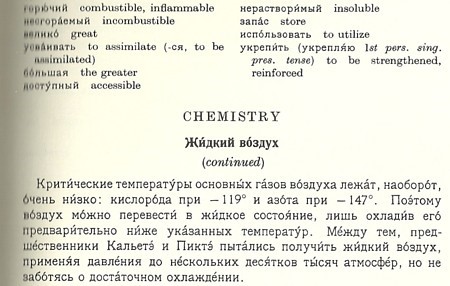
I also had a final exam in Physics 38 the day before, and a Physics 36 final the following Monday. And thus my junior-year studies came to an end!
|
COMING IN JUNE: For the first time, I observe a college Commencement ceremony. On my lab partner's birthday, I give her 21 roses plus a brand new car (an extremely compact one). She also receives a thick instruction manual for her summer job as a pediatric nurse's aide. Meanwhile, I learn that my grade average has fallen, but only slightly — not catastrophically like the Dieffenbachia. Click here to continue. |

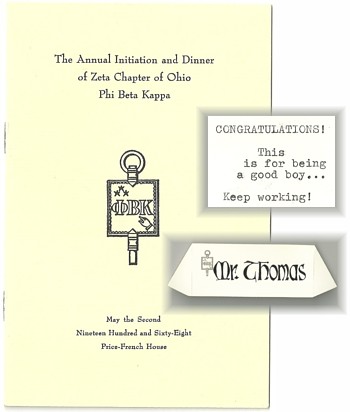






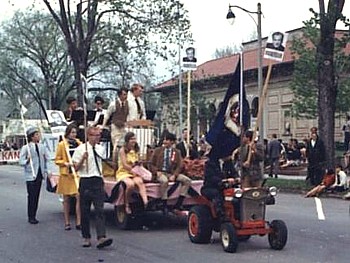
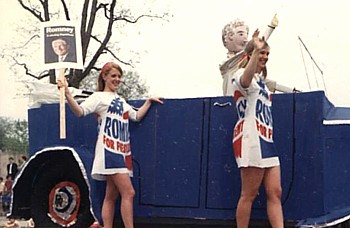
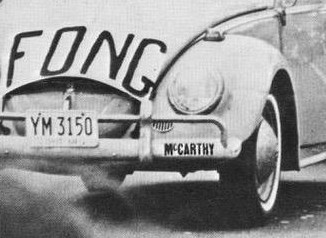
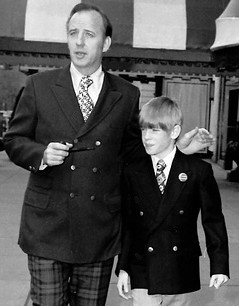
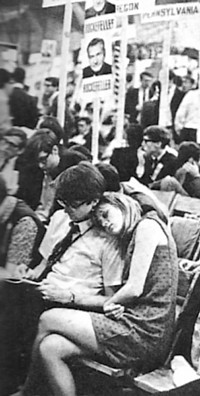 Hi-O-Hi
Photo
Hi-O-Hi
Photo